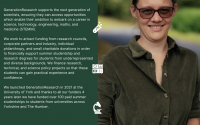GenerationResearch: Providing scientific adventure for young career scientists
- Date
- 22 Jan 2025
- Start time
- 7:30 PM
- Venue
- Mickelgate Social
- Speaker
- Dr Jillian Barlow, University of York

GenerationResearch: Providing scientific adventure for young career scientists
Dr Jillian Barlow, Founder of GenerationResearch, University of York and students
GenerationResearch supports the next generation of scientists, ensuring they can access opportunities which enable their ambition to embark on a career in science, technology, engineering, maths, and medicine (STEMM). We work to attract funding from research councils, corporate partners and industry, individual philanthropy, and small charitable donations in order to financially support summer studentship and research degrees for students from underrepresented and diverse backgrounds. We finance research, technical, and science policy projects so that these students can gain practical experience and confidence. We launched GenerationResearch in 2021 at the University of York and thanks to all our funders 4 years later we have funded over 100 paid summer studentships to students from universities across Yorkshire and The Humber.
Doors open 7pm for a 7.30pm event start:
We are holding this free Cafe Scientifique session on Wednesday 22nd January 2025 from 7pm, talk starting at 7.30pm, in the “Den”, Mickelgate Social, 148-150 Mickelgate on the corner of Bar Lane, York. Nearest car park at Nunnery lane and the venue is a short walk from York Station or Rougier Street buses.
Member’s report
These inspiring presentations explained that this project provides opportunities for paid industrial/academic placements for students. One of the aims is to widen participation in scientific research as a profession. There was a call for participants from both York and Hull Universities via a simple application process. Students didn’t have to present a CV but answer a few simple and easy questions such as “What do you love about science?” There was blind scoring of the answers with 50% selected from the answers and 50% to widen participation.
Students participating explained that these paid placements allowed them to make a real contribution to ongoing research as well as improving their laboratory skills, computational skills, and confidence as a scientific researcher. One example was a student with a 10-week placement with Fontana/Bar Labs who had the opportunity to work on research on the LCMV virus. Another worked with Zeiss Microscopy which led to a longer job and who is now studying for a PhD at the Crick Institute. The collaboration with external partners has been important to drive funding and impact.
One student summed up the results of her placement as “It gave me a clear insight, and increasing confidence, into what it is like to work as a full-time scientific researcher”. As many students have for financial reasons to take part-time jobs and lack mentors to support a future career in STEM, this programme provides a vital first professional step to paid work as a technical or scientific researcher.
Catherine Brophy